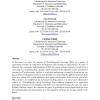Free Online Productivity Tools
i2Speak
i2Symbol
i2OCR
iTex2Img
iWeb2Print
iWeb2Shot
i2Type
iPdf2Split
iPdf2Merge
i2Bopomofo
i2Arabic
i2Style
i2Image
i2PDF
iLatex2Rtf
Sci2ools
100
click to vote
ECIS
2003
2003
Towards work-integrated learning communities
In this paper we raise the concept of Work-Integrated Learning (WIL) as a means of supporting activities of competence development and learning in organisations. In order to illustrate our conceptual understanding of WIL, the paper includes empirical results from a case study in a consultant firm, Ypsilon, which operates in the education sector and delivers courses for IT-professionals. Ypsilon is at present undergoing a transition from having one big customer to being forced into a more flexible way of meeting the different demands from many new clients. The results highlights three main considerations believed to be critical for WIL activities: (i) A shift from an individual teaching culture to a social and collaborative culture. (ii ) Extending the role of technology from codifying competencies to supporting negotiation of practice. (iii) Adoption of holistic and integrated strategy that can cope with a dynamic business context. We conclude the paper by pointing at several implicat...
Related Content
| Added | 31 Oct 2010 |
| Updated | 31 Oct 2010 |
| Type | Conference |
| Year | 2003 |
| Where | ECIS |
| Authors | Ulrika Lundh Snis, Lars Svensson, Christian Östlund |
Comments (0)

